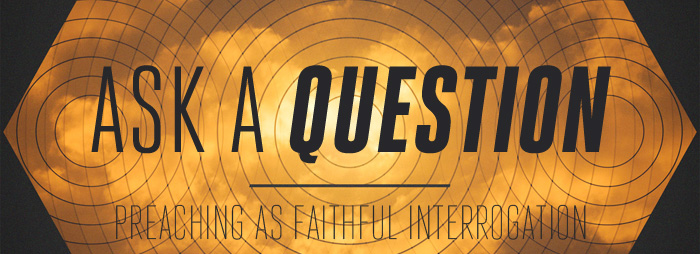It’s not uncommon today to find people, Christians even, who view the preaching event as a mere monologue. But faithful preaching is far from a banal harangue.
In his masterful book Between Two Worlds John Stott advocates a “silent dialogue” in preaching. He writes,
[In every sermon a] silent dialogue should be developing between the preacher and his hearers. For what he says provokes questions in their minds which he then proceeds to answer. His answer raises further questions, to which he again replies. One of the greatest gifts a preacher needs is such a sensitive understanding of people and their problems that he can anticipate their reactions to each part of his sermon and respond to them. . . . We want to provoke people to think, to answer us and argue with us in their minds, and we should maintain such a lively (though silent) dialogue with them that they find it impossible to fall asleep.
Amen. A proper “silent dialogue,” in its most basic form, anticipates the audiences struggles with the text and offers clarity from the text.
But let me take the silent dialogue further in order to ramp up the congregational conversation.
INTERROGATION, INTERROGATION
Maybe it’s because I read too many detective novels or grew up watching too many detective novels, but I love a good interrogation. I appreciate an interrogation scene with such masterful attention to nuance that falsehoods unravel in an instant. Or clarity cuts through the cloud with precision.
Faithful preachers will give such attention to nuance in pursuit of clarity as they preach. We do this by asking our congregation questions. Rhetorical, interrogative questions engage the hearer’s heart and mind, amplifying the silent dialogue, and saving Eutychus.
It’s not uncommon for me to listen to a dozen or so sermons throughout the week, from outstanding preachers no less, and the use of the interrogative seems to be heading the way of the saber-toothed tiger. In other words, it’s vanishing.
But let me offer a small attempt to save the species from extinction.
HONING YOUR QUESTIONING SKILLS
It could be that those expert preachers I listen to are, well, expert in their delivery. So forceful and attractive are their expositional skills that they need not pursue the silent dialogue to keep attention. But we lesser men need to use all the tools at our disposal and thus need to sharpen our interrogation skills.
In every text we have an abundance of opportunities to question our congregation. Sometimes those questions address objections, other times it points to common shortfalls in understanding, or they point the hearer to faithful application of the truth.
Here are a few examples, from recent sermons, of how I tried to engage my congregation in silent dialogue via interrogation:
- After reading about Jesus’ silence before Pilate I asked that age old, elementary question of, “Why?” Saying, “Why did Jesus not open His mouth?”
- When meditating on Jesus’ silence in the face of false accusation (Mark 15:5) I asked, “When was the last time your were falsely accused? What was your immediate reaction?”
- When showing how the crowd in Mark 15:12-15 call for the release of Barabbas instead of Jesus I asked, “Every day the enemy of mankind and Lord of mankind call you to follow, whom will you choose? False saviors that make promises they never can fulfill, or the Savior who Himself is the greatest promise?”
- When talking about the people’s ironic mockeries thrown at Jesus while he was on the cross (Mark 15:26-23) I asked, “Do you see here how the human heart can stand right in the face of truth and yet utterly miss the truth? Could the truth of Christ possibly be staring at you in the face tonight and yet you still miss it?”
- When explaining how the wrath of God fell on Jesus to such a degree that the land went dark for three hours (Mark 15:33) I asked, “What do you think about this wrath of God? Is it an attribute to be announced and amplified? Or minimized and muted?”
- This week I, Lord willing, will preach on Joseph of Arimathea and his burial of Jesus. After explaining who Joseph was from Mark 15:42-44 I hope to say, “I wonder if any of you are quite like Joseph. Are you settled in your faith, but somewhat secret with it?”
A TOOL NOT TO BE UNDERESTIMATED
Interrogation is one of the most basic parts of human conversation. From their earliest ability to speak children ask their parents, “Why?” We preachers need to seize on this ordinarily element of humanity and employ it unto congregational engagement.
When you ascend to the sacred desk this week, reverently think about it as though you have come to the interrogation room. Question them, poke, prod, and uncover their soul so they might discover the glorious of Christ.

